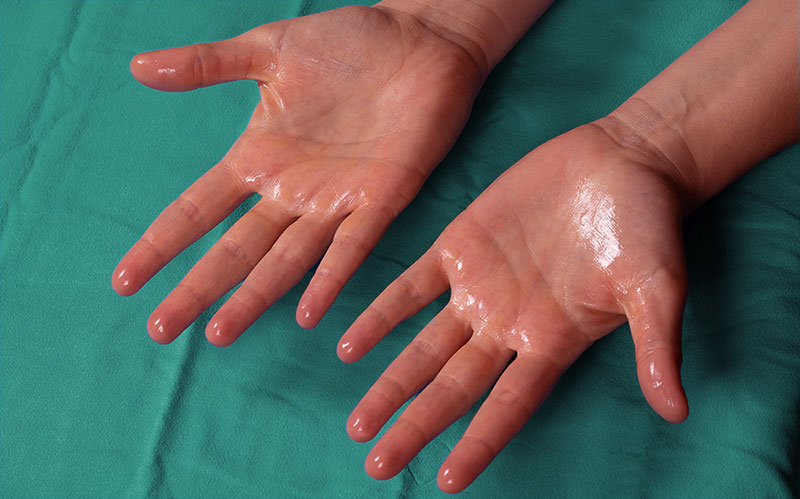Comprehensive Guide to Sweaty Hands Treatment: Proven Dermatology Strategies
Comprehensive Guide to Sweaty Hands Treatment: Proven Dermatology Strategies
Blog Article
Recognizing the Source of Excessive Sweating and Its Influence On Day-to-day Live
Excessive sweating, likewise known as hyperhidrosis, is a condition that impacts a substantial section of the populace, yet its hidden reasons and ramifications on day-to-day functioning continue to be somewhat enigmatic. While it is typically understood as a physical action to manage body temperature level, the triggers for too much sweating can differ commonly among people, encompassing not only physical elements however psychological and additionally emotional aspects. The impact of this problem prolongs past simple pain, typically influencing social interactions and total top quality of life. By delving right into the origin of hyperhidrosis and exploring its complex impacts, a much deeper understanding of this pervasive problem can be obtained, shedding light on the complexities that people facing excessive sweating navigate every day.
Physiology of Sweat Glands
The guideline of sweat production, an essential physiological process, is mostly managed by the task of sweat glands dispersed across the human body. Sweat glands are classified right into two primary kinds: eccrine and apocrine glands.
When the body temperature level climbs, either because of exercise, high temperatures, or emotional anxiety, the nerves activates the gland to generate sweat. This sweat is composed primarily of water and electrolytes like sodium and chloride. The process of sweat production is necessary for preserving the body's interior temperature level within a slim, optimum array, highlighting the critical function gland play in human physiology.
Triggers for Excessive Sweating
In understanding the origin of excessive sweating, it is critical to determine the triggers that can cause this physical reaction. Too much sweating, also referred to as hyperhidrosis, can be prompted by numerous factors, both physical and ecological. One usual trigger is emotional stress or stress and anxiety, which can promote the body's gland to generate even more sweat than is required for cooling. Physical effort, heats, and spicy foods are additionally understood to cause extreme sweating in individuals susceptible to this condition. Particular clinical problems like hyperthyroidism, diabetic issues, or menopause can add to too much sweating as well.
Furthermore, medicines such as some antidepressants, opioids, and specific supplements can likewise act as triggers for hyperhidrosis. Comprehending these triggers is vital in taking care of excessive sweating efficiently - Treatment for hyperhydrosis of hands. By identifying and addressing the details triggers that motivate extreme sweating in a specific, healthcare carriers can develop tailored treatment plans to relieve this problem and boost the individual's lifestyle
Medical Issue Associated
Related to excessive sweating are different clinical problems that can worsen this physical action. One common condition is hyperhidrosis, a disorder characterized by unusually boosted sweating that exceeds the body's thermoregulatory demands. This can materialize in focal areas like the palms, soles, underarms, or face, impacting a person's lifestyle as a result of social shame and discomfort.
Additionally, endocrine problems such as hyperthyroidism, diabetic issues, and menopausal warm flashes can also result in excessive sweating. Hyperthyroidism causes an overflow of thyroid hormones, accelerating metabolism and triggering sweating. Diabetic issues can induce sweating episodes, particularly throughout hypoglycemic episodes when blood sugar level levels go down also low. Menopausal warm flashes, associated to hormonal changes throughout menopause, can create extreme and abrupt sweating, usually gone along with by flushing and heart palpitations.
Furthermore, infections like endocarditis, consumption, and hiv have actually been linked with night sweats, an usual signs and symptom known to interrupt sleep and influence overall health. These clinical conditions highlight the varied variety of underlying factors that can add to excessive sweating, demanding thorough evaluation and management by medical care professionals.
Emotional and Emotional Factors

Influence On Social Communications
Too much sweating can have profound effects on a person's ability to engage easily in social interactions. The visible indications of sweat spots or wet spots on apparel can result in humiliation and self-consciousness, creating people to withdraw from social circumstances. This withdrawal can impact connections, limitation social tasks, and prevent expert and individual development.

In addition, the anxiety and self-esteem concerns originating from extreme sweating can influence communication and interpersonal skills. People may battle to concentrate on discussions, join team tasks, or share themselves confidently. This can bring about feelings of isolation and isolation, as social links end up being challenging to maintain.
Conclusion

While it is generally comprehended as a physical feedback to control body temperature, the triggers for extreme sweating can vary widely amongst individuals, incorporating not only physical factors yet psychological and likewise emotional components. By delving into the origin triggers of hyperhidrosis and exploring its diverse results, a much deeper understanding of this prevalent issue can be gotten, shedding light on the intricacies that people grappling with excessive sweating browse on a daily basis.
Physical physical effort, high temperatures, and spicy foods are additionally understood to trigger extreme sweating in people prone to this problem. By identifying and attending to the details triggers that prompt too much sweating in an individual, healthcare service providers can create individualized therapy strategies to reduce this problem and boost the individual's high quality of life.
Extreme sweating can have extensive results on an individual's capability to engage comfortably in social interactions.
Report this page